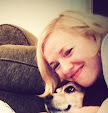Clockwise from top left: Dave, Kevin, Kelly, Catherine making a weird face, Julia, and Monika
Recently I instituted "English Playtime" with my youngest class, my six-year-olds, using the theory that they're old enough now to speak only English at LCI, with no Korean at all until they get on the bus to go home (remember that six year olds are around five years old in American age). Two of my little girls have been making a real effort in the last few days to actually speak English during playtime, with super cute results - for instance, they spent today's playtime almost entirely correcting each other's English. While playing with alphabet magnets, Julia called to Catherine in Korean, and Catherine said, "Julia, English please!" Just like a tiny Emily Teacher.
And Julia was at a little bit of a loss to respond in English, so she just said, "Catherine..." and thought about it for a minute.
Catherine tried to prompt her: "Catherine mwo?" And then she clapped her hand over her mouth, and said "No no no - what." She tried again. "Catherine come on?"
Julia was relieved. "Catherine, come on," she repeated.
Catherine turned to her cubby to get something, supremely proud of herself. "Just a minute!"
"Just a minute" is something new she's learned, which she was extremely self-satisfied to be using today. She also whipped this one out: After I helped her unbutton her coat, and after a pause to remember the right way to say it, she said, "Thank you for help me!" And grinned wide. Catherine loves learning English and she loooooves getting acknowledgment from teachers about how much she knows. Hence how diligent she's been about English Playtime.
Yesterday was the first time Julia and Catherine really tried to follow the rules in earnest, and they couldn't even talk to each other for the whole first five minutes, just holding dolls and addressing each other helplessly:
"Catherine!"
"Julia!"
"Catherine!!"
"Julia!!"
Eventually they figured out how to ask each other for different dolls ("Mother please"; "Yes") and play with mostly gesture. Fortunately it's like a game to them; to my class of seven-year-olds it's clearly more like unnecessary punishment. This is the first time my seven-year-olds have taken English, however, so they kind of don't know what they're doing here in the first place.
My six-year-olds are pretty used to the way things work. Every time they speak Korean to each other now (which is still PREEETTY often I'm sad to say; come on, kids, you know the rules), they instantly look at me and bellow, "I'M SORRY EMILY TEACHER," in hopes of preventing me from erasing a smiley face. Oh kids, what futility.
That's my system: they start the day with three smiley faces by their name. If they speak Korean, I erase one. At the end of the day, smiley faces translate to stickers on a chart. If they earn enough stickers, they get candy. Candy is big time currency in Little Kid World. This convoluted smiley face/sticker/candy system predates me; I just followed some long-gone foreign teacher's lead back when I had zero idea what was going on at LCI at any given time. Everybody's got their own version of stickers/candy/smiley faces.
It's weird how well that stuff works; like when I count to five, there's a mad dash for everybody to find their chairs or their pencils or cross their legs or sit on the floor or do whatever else they're supposed to be doing. My kids reacted this way instantly, on the first day I taught, before they even knew what consequences I was going to dole out when I got to "five". And I've made kids cry before by erasing their smiley faces. Which are drawn with dry erase marker on a whiteboard. But kids take that stuff seriously. When one of them says "I'm sorry" and the other doesn't say "That's okay," they get teary. Stickers and Pokemon cards and corn-chip snacks are treated like gold, and whichever kid brought them into class is the new class president.
I love it. I think it's sweet what little adults they carry themselves like, and the tiny adult societies that they form. When I heard about teaching English in Korea I never pictured teaching kids, never having been responsible for a kid for more than like 45 minutes, ever, unless you count my little brother, kind of. But now I'm so glad I get to remember how great kids are. Kids are pretty great. I could see working with kids for a long time.
